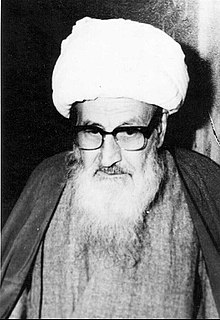Mohammad Ali Araki
Mohammad Ali Araki محمدعلی اراکی | |
|---|---|
 Grand Ayatollah Mohammad Ali Araki | |
| Personal life | |
| Born | 22 December 1894 |
| Died | 24 November 1994 (aged 99) |
| Resting place | Fatima Masumeh Shrine |
| Other names | Persian: محمدعلی اراکی |
| Religious life | |
| Religion | Shia Islam (Usuli Twelver) |
Grand Ayatollah Mohammad Ali Araki (Persian: محمدعلی اراکی, 22 December 1894[1] in Arak – 24 November 1994 in Qom)[2][3] was an Iranian Twelver Shia Marja'. Araki was teacher of many Iranian revolutionary person and was the last survivor from Ruhollah Khomeini's era. When he died, IRNA declared that "he was considered the greatest living Marja'".[4]
Biography
[edit]Mohammad Ali Araki was born in 1894 in Arak, Iran. He started his education from Arak Hawza. Grand Ayatollah Haeri allowed him to wear the turban and robe because qualified individuals were limited. Also, Araki studied many years in Yazd Hawza. After that he migrated to Qom and continued his studying under supervision of Abdul-Karim Ha'eri Yazdi.[5] After the death of Ruhollah Khomeini, Ayatollah Mohammad-Reza Golpaygani was selected by Society of Seminary Teachers of Qom as Marja' for Khomeini's followers and after Golpaygani's death Araki was introduced.[6][7] So, Araki was the last survivor from Ruhollah Khomeini's era.[4]
Death
[edit]Ayatollah Araki died on 24 November 1994 at the age of 99.[4][8][9] He was buried in Qom's Fatima Masumeh Shrine.[5]
See also
[edit]References
[edit]- ^ The calendar of Jamadi al-Thani Archived 2018-11-16 at the Wayback Machine ahlolbait.com
- ^ Grand Ayatollah Mohammad Ali Araki Archived 2017-12-28 at the Wayback Machine revolution.pchi.ir
- ^ "مرحوم آیتالله اراکی، از مجالست با اهل غفلت خودداری میکرد - تماشاگر پلاس". Archived from the original on 2017-12-29. Retrieved 2020-04-06.
- ^ a b c "MOHAMMAD ALI ARAKI DIES AT 100". The Washington Post. 30 November 1994. Archived from the original on 2 December 2017. Retrieved 11 April 2016.
- ^ a b "Ayatullah Al-Uzama Mohammed Ali Araki". www.islamic-laws.com. Archived from the original on 6 July 2022. Retrieved 11 April 2016.
- ^ Said Amir Arjomand; Nathan J. Brown (25 March 2013). Rule of Law, Islam, and Constitutional Politics in Egypt and Iran, The. SUNY Press. p. 6o. ISBN 978-1-4384-4598-4.
- ^ David Menashri (5 November 2013). Central Asia Meets the Middle East. Routledge. p. 94. ISBN 978-1-135-24150-6.
- ^ Said Amir Arjomand (20 November 2009). After Khomeini: Iran Under His Successors. Oxford University Press. p. 175. ISBN 978-0-19-973955-4. Archived from the original on 16 February 2017. Retrieved 25 October 2016.
- ^ "Araki Events in History". Brainy History. Archived from the original on 6 July 2022. Retrieved 11 April 2016.
External links
[edit]
